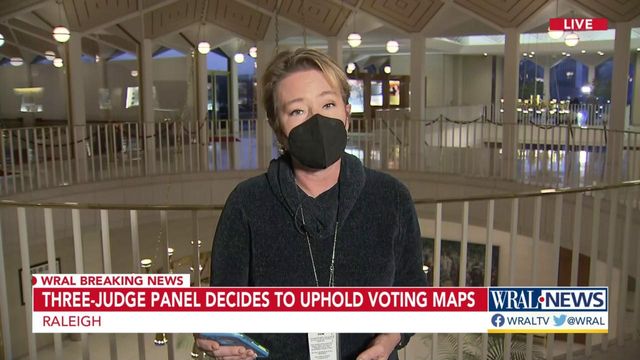Voting maps favorable to NC Republicans allowed to move forward, judges rule
The ruling announced in Wake County Superior Court is expected to be appealed, ultimately landing before the state Supreme Court
Posted — UpdatedThe decennial redistricting process strongly influences the future political direction of the state. Tuesday’s decision from a three-judge panel increases the chances for Republicans to sizably expand their political power, as the GOP had been looking to reclaim a veto-proof majority in the legislature and help national Republicans regain control of the U.S. House.
The panel said the groups challenging the maps didn’t show sufficient proof of racial motives behind the GOP-led map-making process. But the organizations did successfully show the newly passed congressional map was “the product of intentional, pro-Republican partisan redistricting” and the legislative plans were “extreme outliers,” according to the court.
Despite the evidence of partisan gerrymandering, the panel wrote that drawing boundaries for partisan advantage is not forbidden under state law.
The Southern Coalition for Social Justice and North Carolina League of Conservation Voters, two of the plaintiffs, is appealing the ruling, which was announced in Wake County Superior Court. The case is expected to go before the state Supreme Court, where judges who are registered Democrats outnumber Republicans 4-3.
“We remain confident that our conclusive evidence of partisan bias, obfuscation, and attacks on Black representation, from expert testimony to the mapmakers’ own admissions, will convince the state’s highest court to protect voters from nefarious efforts to entrench partisan power at the expense of free elections and fair representation,” said Hilary Harris Klein, the coalition’s senior counsel for voting rights.
The maps draw new lines for the state’s congressional and legislative districts. They were created by the legislature’s Republican majority and approved in November.
Voting rights groups, including the coalition and the NCLCV, challenged the maps, saying the districts favor Republicans in a way that violates residents’ rights to a free and fair election.
The congressional map as drawn, for instance, would likely give Republicans 10 or 11 of the 14 U.S. House seats up for grabs in a state where voters are almost evenly split. This was achieved in part by splitting the Democratic-leaning counties of Guilford, Mecklenburg and Wake among three congressional districts each. Only one of the 14 newly drawn districts is highly competitive, while two others that favor GOP candidates are somewhat competitive.
The court concluded, however, that the free elections clause of the state constitution “does not operate as a restraint on the General Assembly’s ability to redistrict for partisan advantage.”
Republican leaders say they complied with map-drawing rules and that the process was widely visible to the public.
"Free and fair elections are the result of an open and honest process,” North Carolina’s House speaker, Tim Moore, said in a statement Tuesday. “The General Assembly's maps were drawn in the light of day, after months of public comment and feedback.”
The plaintiffs’ case was combined and sent through an expedited trial last week so that the case could be heard ahead of primary elections in the state. The state Supreme Court delayed the primaries from March 8 to May 17 so that the lawsuits could be heard.
Republicans, including six legislative leaders named in the lawsuit, have long said they did not use racial or partisan data when drawing the maps to ensure the boundaries complied with the state constitution, though one GOP expert acknowledged the lines favor Republicans.
The state Supreme Court appointed a panel of three judges to hear the case. Judges Graham Shirley, Nathaniel Poovey and Dawn Layton, two Republicans and a Democrat, issued the ruling.
North Carolina Democratic Party Chair Bobbie Richardson said Tuesday that GOP leaders “cheated by using secret maps and closed door strategy sessions, then destroyed the maps they used.”
“They are trying to steal seats through illegal partisan gerrymandering and are choosing to proceed with costly litigation that hardworking taxpayers will pay for,” Richardson said in a statement.
Despite seeing a dwindling share of votes in recent election cycles, Republicans would almost assuredly see increased representation in the North Carolina General Assembly under the new legislative map.
If the Republicans capture a supermajority in both chambers, which the map they passed in November makes easier to accomplish, they could turn bills into law without support from the state’s Democratic governor, Roy Cooper.
The court ordered that candidate filing, which was halted last month after the state Supreme Court pushed back the primaries, resume at 8 a.m. on Feb. 24. Filing is scheduled to end at noon on March 4. The high court could choose to adjust that timetable.
Republicans have asked two registered Democrats on the Supreme Court, Justices Sam Ervin and Anita Earls, to recuse themselves from the redistricting case. Voting rights group filed a motion for Justice Phil Berger, Jr., a registered Republican and son of one of the defendants, to recuse himself.
Related Topics
• Credits
Copyright 2024 by Capitol Broadcasting Company. All rights reserved. This material may not be published, broadcast, rewritten or redistributed.






